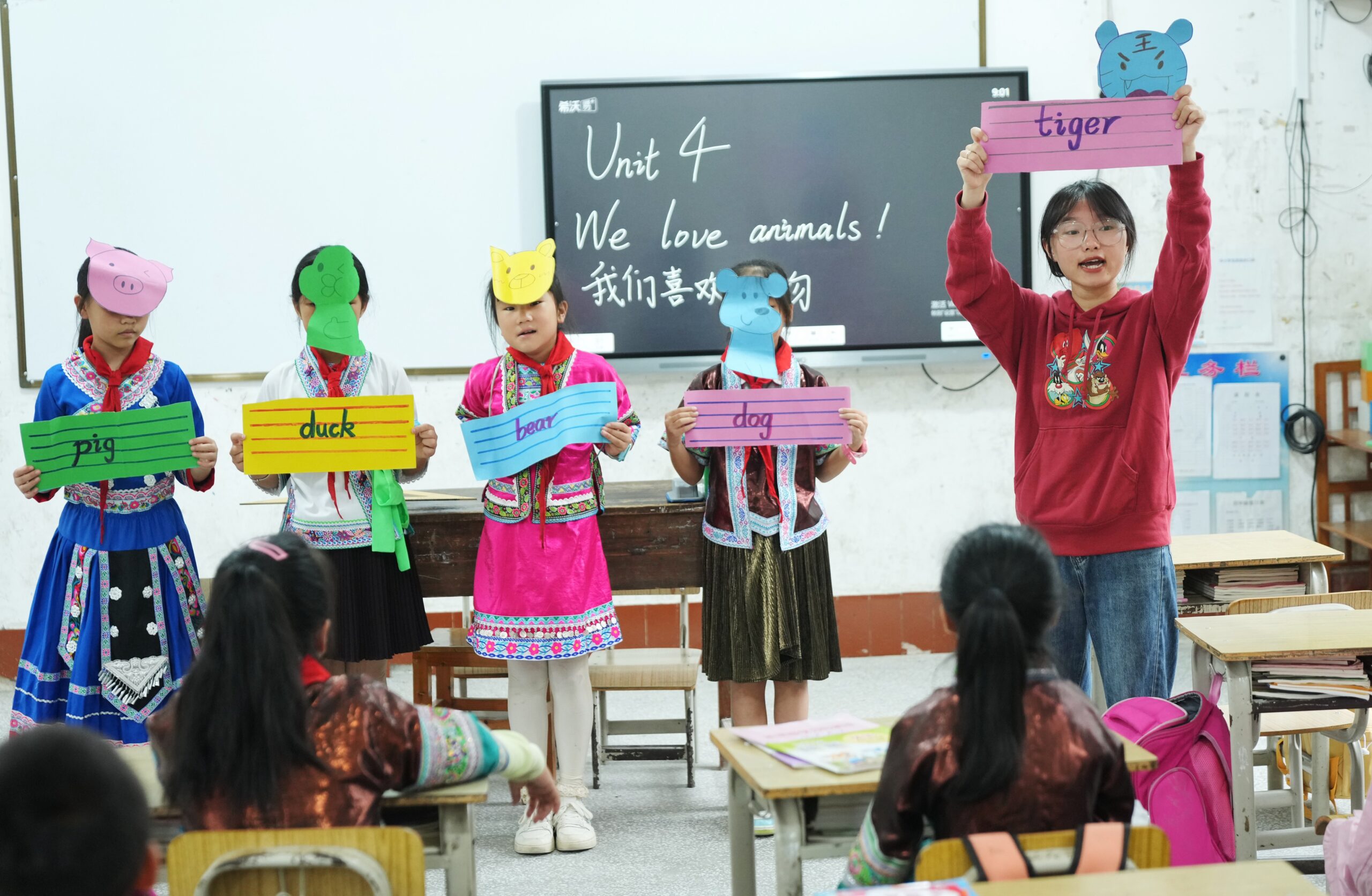Leading Chinese university nixes English requirement, igniting nationalistic fervor
Today, many young Chinese are caught between a belief in the importance of cultural confidence and the need to exist in a globalized world in which English carries economic privileges and professional opportunities.

Xi’an Jiaotong University, one of China’s leading higher-education institutions, has removed English tests as a graduation requirement. It is a reversal of a 2019 initiative designed to increase English proficiency among its students. With the decision, Xi’an Jiaotong University has joined a growing list of Chinese schools that have reduced English classes and testing.
While the university called the move “completely responsible,” the news has set off a fierce debate on the Chinese internet, with supporters praising it as a demonstration of cultural confidence and disparagers arguing that rejecting English would make Chinese youth less connected to other parts of the world.
The decision was announced on Thursday by the school’s office overseeing academic affairs. Starting on September 1, the university will no longer use the results of its own English proficiency exam, nor CET4 and CET6 — two major standardized English tests supervised by the Ministry of Education and designed for Chinese college students – nor any other assessment tools made by third-party entities to determine if a students is qualified to obtain their bachelor’s degree. The policy change, the school stressed, was made after multiple rounds of discussions among members of its undergraduate academic council.
The announcement marked a major reversal of a previous program launched by the university in 2019, where it introduced a string of reforms in testing and curriculum in order to close the disparities in English proficiency among students, reduce the mismatch between the English used in assessments and the English used in real-world communication, and keep students motivated in their language learning.
As part of the efforts, the school devised its own English test, which was mandatory for students who had completed all of its English courses required for graduation. Alternatively, students were allowed to prove their English proficiency by scoring certain points in other exams, which included the Test of English as a Foreign Language, or TOEFL, and the International English Language Testing System, or IELTS, which are two widely recognized measures of English proficiency often used by Western universities in evaluating international students for admission.
Though abrupt, the abandonment of the old pro-English initiative “makes total sense,” as a spokesperson for the university explained to local media. He noted that the decision was in line with a trend among Chinese colleges, many of which — such as Sichuan University — had already nixed the English requirement for graduation in 2021. But Xi’an Jiaotong University, which consistently ranks in the top 20 nationwide, was arguably the first top-tier Chinese university to dilute graduation standards for English.
China’s inward turn
In China, where educational reforms are in tandem with changes in social, economic, and political milieu, English teaching was first given prominence when Dèng Xiǎopíng 邓小平 came to power, transforming the country’s inward-looking, agrarian economy to an industrial powerhouse under the twin policies of “reform and opening up.” Seen as crucial to Deng’s efforts to make China modern and more engaged in international activities, English education was encouraged. In 1978, a year after Deng brought back the gāokǎo 高考, the national college entrance exam, English was included as one of the subjects tested.
“Going back 30 years, communist China generally abandoned English-language education after 1949 during its honeymoon with the Soviet Union,” said Benjamin Qiu, whose paternal grandfather, Qiú Kèān 裘克安, was in charge of the translation department of the P.R.C. Foreign Ministry until he retired in the early 1980s.
Back then, “many urban young people, including some of my family members of my parents’ generation, learned Russian, which turned out to be not very useful,” Qiu, a New York–based partner with the law firm Elliott Kwok Levine & Jaroslaw, which specializes in Chinese cross-border disputes and transactions, told The China Project.
When China joined the World Trade Organization in 2001, it made English a compulsory subject in primary schools. At the time, the inclusion was interpreted as a sign that the once-insular country was looking to increase contact with the rest of the world, especially the West.
But in recent years, as the pendulum of China’s diplomatic policies swings back toward nationalism-fueled, pandemic-enforced isolation, English seems to be falling out of favor. At China’s annual “Two Sessions” meetings, where the country’s top legislative and advisory bodies are convened to discuss the central government’s priorities, there’s been no shortage of proposals calling on schools to marginalize English teaching.
In 2020, a delegate to the National People’s Congress (NPC) called for “a better protection of Chinese language” and “a reevaluation of the importance of English at schools.” Earlier this year, several representatives at the political gathering suggested scaling back English teaching and reducing its importance in the gaokao, with one arguing that because most Chinese people didn’t use English in their daily lives, learning the language was an unnecessary burden for students.
While the Education Ministry said last year that the weighting of English in the gaokao would not change, stressing that the foreign language is vital to cultivating students’ cultural awareness and international mindset, it didn’t stop Shanghai from removing English from year-end exams in primary schools. A growing number of public schools in Beijing and Shanghai have gradually reduced the number of English classes in recent years, with many also complying with a policy that forbids them from using textbooks published overseas that haven’t been reviewed and approved by local authorities.
According to EF Education First, a Switzerland-headquartered international education company, Chinese people’s abilities to speak English have been in decline in the past few years. In its 2022 global ranking of English proficiency, China is ranked 62nd among 111 non-English-speaking countries and regions, below Guatemala and Vietnam.
Asked by the state-owned China Daily newspaper to comment on the downward trend of English learning, an associate English professor at Guangxi Normal University pinned the blame on a “deteriorating” atmosphere, saying that “shortsighted views and misunderstandings” that see English education as a threat to China’s national identity “have influenced students’ English levels.”
On Chinese social media, this dichotomy — English as a suspicious foreign influence vs. English as a useful language tool — is what every debate about English learning can be boiled down to. The heated discourse spurred by Xi’an Jiaotong University’s news announcement is no exception.
On Weibo, where hashtags related to the news have collectively garnered more than 500 million views, the university’s decision triggered a wave of nationalistic response. “I hope that other schools will follow suit. It doesn’t make sense that a Chinese student needs to speak good English for a Chinese degree,” a Weibo user argued.
The most influential voice in the pro-English camp came, perhaps surprisingly, from Hú Xījìn 胡锡进, the former editor-in-chief of the nationalist tabloid Global Times. “For young Chinese to embrace the modern world and participate in the global competition, speaking English is an advantage,” Hu wrote in a post on Thursday. In response to the nationalistic pushback against English studying, Hu noted that although the sentiment is sound, the matter shouldn’t be “overly politicized.”
In the eyes of Dr. Jenny Lee, a professor of educational studies and practice at the University of Arizona, the decision made by Xi’an Jiaotong University wasn’t surprising “given the rise of China’s scientific production, including in Chinese journals,” she told The China Project. “The result appears to be a move toward greater Chinese independence over interdependence with the West.”
The rich and the educated
English is the most spoken language in the world, with the number of speakers totaling more than 1.4 billion in 2022. A 2019 survey conducted by U.K. market research firm YouGov, which polled more than 25,000 adults across 23 countries, showed that English was overwhelmingly seen as the most important language for children to learn, with Mandarin Chinese quickly catching up.
Today, young Chinese are caught between a belief in the importance of Chinese language and culture and the need to exist in a globalized world in which English carries economic privileges and professional opportunities. As some observers pointed out online, despite the anti-English tide in schools, multinational corporations still view English as an important skill for their Chinese employees. “To those who are delighted by the news, don’t cry when you can’t land a job in your dream company because you can’t speak English,” a Weibo user advised.
In the summer of 2021, the Chinese government launched a sweeping clampdown on its private tutoring sector, banning it from providing for-profit classes on school curriculum subjects. The high-profile campaign, widely known as shuāngjiǎn 双减 in Mandarin, or “Double Reductions,” was meant to ease the burden on students, but it has also inadvertently exacerbated educational inequality in China, as affluent parents eager to give their kids a head start in education have turned to expensive, underground tutoring services, which have mushroomed across the country.
“The privileged class will always find ways to have their kids ‘win’ in all sorts of means, including underground tutoring, overseas summer or winter camps, or just emigration,” Qiu said. He added that the growing aversion to English in China reminded him of Japan, which is known for its monolingualism.
“As Japan got rich, many of its families saw less importance in sending kids to have expensive foreign education, especially when Japanese universities got better,” he said. But China’s rejection of English education will cost opportunities for many people. “China is not there in terms of wealth. It still has a lot to learn from Western technologies and academia, and the yuan is depreciating recently. Studying English locally is arguably more important than before.”
Even for the wealthy, China’s de-emphasis on language education is an inconvenience if they are planning to move abroad. “Language capabilities of course would contribute to a reluctance to emigrate, but that doesn’t seem to have stopped the willing,” he said. “The walk back from English education in China, however, probably reflects the government’s newfound hostility to the West, which wouldn’t help the new Chinese immigrants to assimilate with Western values, and might cause more Western countries to be guarded against Chinese immigrants.”






